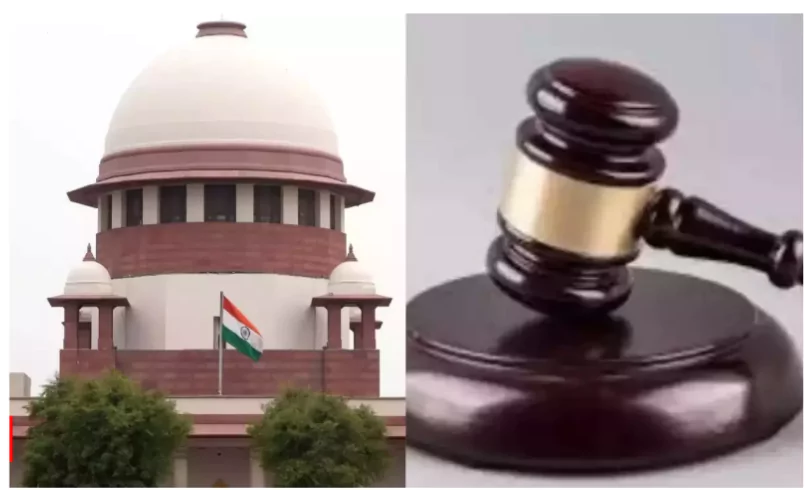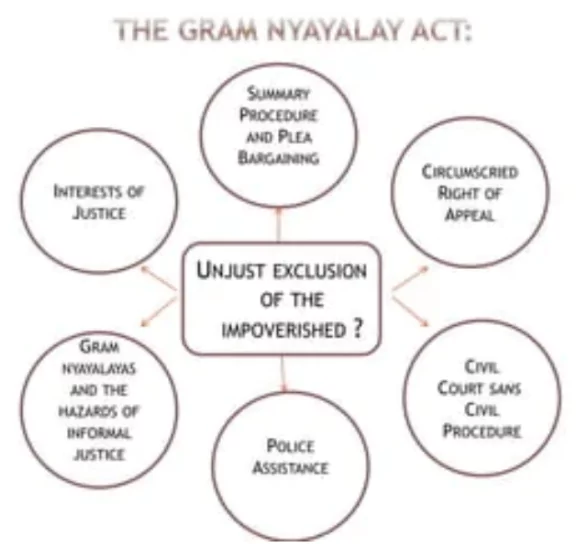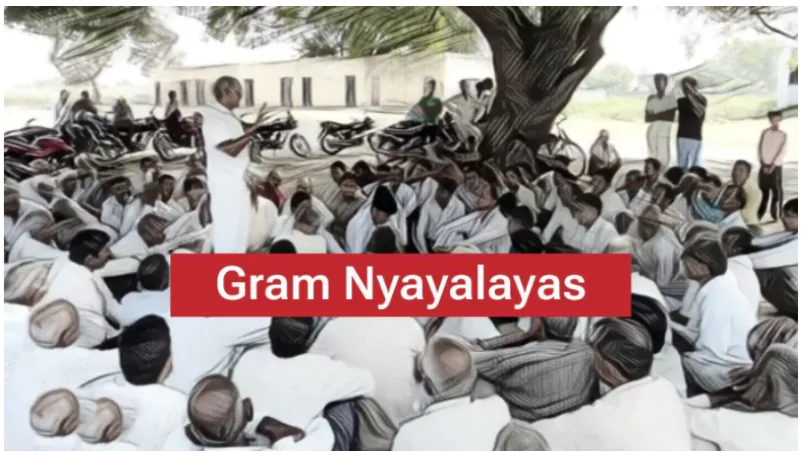Recently, the Supreme Court expressed that it would consider the question as to whether establishment and effectuation of Gram Nyayalayas by States/UTs is mandatory under the Gram Nyayalayas Act, 2008.
Background of the Case

- Public Interest Litigation (PIL) seeks the establishment and implementation of Gram Nyayalayas under the Gram Nyayalayas Act, 2008 in 2019.
- Gram Nyayalayas aim to provide speedy, affordable justice in rural areas.
- Key Legal Issue:
- Question: Is it mandatory or optional for states to establish Gram Nyayalayas under the 2008 Act?
- Section 3(1) of the Act uses the term “may,” raising debate over whether it implies discretion or obligation for states to set up these courts.
Supreme Court’s Directions
- States must provide detailed information about the status of Gram Nyayalayas after consulting High Court Registrar Generals within six weeks.
- The Union Government is directed to file a fresh affidavit regarding compliance with the 2020 Court order, especially concerning funding and financial support for these courts.
- 2020 Order: Right to justice includes the right to affordable justice.
- It directed the states, which had not yet issued notifications for establishing Gram Nyayalayas, to do so within four weeks, and asked the high courts to expedite the process of consultation with state governments on this issue.
- The Court will examine whether establishing Gram Nyayalayas is mandatory in a separate hearing.
Enroll now for UPSC Online Course
About Gram Nyayalaya
- Origin: The Law Commission of India, in its 114th Report, had suggested the establishment of Gram Nyayalayas for providing affordable and quick access to justice to the citizens at their doorsteps.
 Establishment: Gram Nyayalayas Act, 2008 has been enacted to provide for the establishment of the Gram Nyayalayas at the grassroots level
Establishment: Gram Nyayalayas Act, 2008 has been enacted to provide for the establishment of the Gram Nyayalayas at the grassroots level-
- Statutory and Quasi-judicial body.
- The Act extends to the whole of India, except to the States of Nagaland, Arunachal Pradesh, Sikkim.
- Definition: Gram Nyayalaya shall be a mobile court and shall exercise the powers of both Criminal and Civil Courts.
- Purposes: The purpose of Gram Nyayalayas is providing access to justice to the citizens at their doorsteps and to ensure that opportunities for securing justice are not denied to any citizen due to social, economic or other disabilities.
- Appeal Procedures:
- Criminal Cases: It shall be taken to the Court of Session.
- Civil Cases: It shall be taken to District court.
Supporting Provisions in Constitution
- Article 39A: Added by 42nd CAA 1976 in DIRECTIVE PRINCIPLES OF STATE POLICY (Part IV) of Indian constitution directs the State “to ensure equal justice on a basis of equal opportunity and shall provide free legal aid”.
- Part IX ( Panchayats): Emphasises decentralisation of power and grass-roots level governance, which Gram Nyayalayas support.
|
-
- Timely Disposal of Appeals: Appeals in both cases have to be heard and disposed of within six months.
- According to the Department of Justice, Currently, only 15 states/UTs have notified Gram Nyayalayas.
- There are only 313 operational out of 481 notified Gram Nyayalayas across the country.
Features of Gram Nyayalaya
- Jurisdiction Notification: The State Government, in consultation with the High Court, notified the boundaries of the area under the jurisdiction of a Gram Nyayalaya. It can also alter such limits at any time.
- Mobile Court Sessions: It can hold mobile courts in villages falling under its jurisdiction and the State Government shall extend all required facilities.
 Presiding Officer: The Gram Nyayalaya shall be Court of Judicial Magistrate of the first class and its presiding Officer (Nyayadhikari) shall be appointed by the State Government in consultation with the High Court.
Presiding Officer: The Gram Nyayalaya shall be Court of Judicial Magistrate of the first class and its presiding Officer (Nyayadhikari) shall be appointed by the State Government in consultation with the High Court.- Appointment Process: The State Government shall appoint a presiding officer called Nyay Adhikari for every Gram Nyayalaya in consultation with the High Court, who will be a person eligible to be appointed as a Judicial Magistrate of the First Class.
- Seat: Seat of the Gram Nyayalaya will be located at the headquarters of the intermediate Panchayat, they will go to villages, work there and dispose of the cases.
- Establishment in every district: The Gram Nyayalaya shall be established or every Panchayat at intermediate level or a group of contiguous Panchayats at intermediate level in a district or where there is no Panchayat at intermediate level in any State
- Initial Proposal: The Gram Nyayalayas were initially proposed to be set up at the intermediate panchayat level with a one-time budget of Rs. 18 lakhs for non-recurring expenses.
- The Central Government also covered 50% of recurring expenses for the first three years.
- Trial Jurisdiction: Gram Nyayalayas are authorised to handle criminal cases, civil suits, claims, or disputes as outlined in the First and Second Schedules of the Act.
- Offences not punishable with death, imprisonment for life or imprisonment for a term exceeding two years.
- Summary Procedure: The Gram Nyayalaya shall follow summary procedure in criminal trials.
- Not Bound by Indian Evidence Act: The Gram Nyayalaya shall not be bound by the rules of evidence provided in the Indian Evidence Act, 1872 but shall be guided by the principles of natural justice and subject to any rule made by the High Court.
- Conciliation Methodology: The Gram Nyayalaya shall try to settle the disputes as far as possible by bringing about conciliation between the parties and for this purpose, it shall make use of the conciliators to be appointed for this purpose.
Check Out UPSC CSE Books From PW Store
Significance of Gram Nyayalayas
- Access to Justice: Gram Nyayalayas bring judicial services closer to rural populations, ensuring speedy and affordable justice in remote areas.
- De-clogging Courts: By handling minor civil and criminal cases at the local level, Gram Nyayalayas can help reduce the burden on overburdened District and subordinate courts.
- District and subordinate courts are the biggest contributors to pending cases, with 4,53,51,913 cases pending with them
- Cost-effective Legal Recourse: Legal proceedings in Gram Nyayalayas are designed to be low-cost, benefiting economically disadvantaged groups.
- Informal and Efficient Procedures: They follow a simplified procedure, with no strict adherence to formal rules of evidence, which makes the process faster and more accessible for common people.
- Promoting Local Justice: Gram Nyayalayas function within rural communities, encouraging local dispute resolution with sensitivity to local needs and cultural context.
- Empowering Rural Governance: These courts complement the decentralisation of governance by reinforcing law and order in panchayat areas, which strengthens the rule of law in rural settings.
Challenges of Gram Nyayalayas
- Delay in Implementation: The Gram Nyayalaya Act is of 2008. Sixteen years have gone by and we are faced with this situation where not even four per cent of Gram Nyayalayas have been established.
- Lack of Infrastructure: Many Gram Nyayalayas lack basic infrastructure like courtrooms, technology, and support staff, limiting their effective functioning.
- Not mandatory: The Act does not make setting up of Gram Nyayalayas mandatory: Section 3 of the Act provides that state governments “may” constitute Gram Nyayalayas.
- Jurisdictional Overlaps: Conflicts may arise with existing courts at tehsil levels, leading to confusion and overlapping jurisdiction issues.
- Overburdening High Courts: They may end up burdening high courts with appeals and writ petitions.
- Funding Constraints: States often face challenges in allocating adequate financial resources for establishing and maintaining these courts, especially in rural and less-developed areas.
- Kerala raised a demand for additional funds for expanding Gram Nyayalayas, but Kerala government had postponed disbursement of funds for courts saying: ‘Deferred for better times’.
- Underutilization of resources: In some regions, Gram Nyayalayas handle very few cases, leading to concerns about their cost-effectiveness and underutilization.
- Examples like Karnataka, where a Gram Nyayalaya handled only 116 cases in four years, despite the significant cost of maintaining such courts.
- Lack of Awareness: Many rural populations remain unaware of the existence and benefits of Gram Nyayalayas, limiting their reach and effectiveness.
Way Forwards to Strengthening Gram Nyayalayas
- Expedited Implementation: Ensure timely establishment of Gram Nyayalayas in all states as per the 2008 Act. Monitor and evaluate the implementation progress regularly.
- Proposed Amendment: Act should be amended- Jurisdiction of the Gram Nyayalayas may be redefined in order to remove the ambiguities regarding the jurisdiction of Gram Nyayalayas.
Supreme Court Concerns and Recommendations on Gram Nyayalayas
- State-Specific Needs: Establish Gram Nyayalayas based on individual state requirements, with input from the Chief Justice of the High Court and state governments.
- Focus on Regular Courts: Prioritize increasing the number of regular courts and improving their infrastructure over setting up new Gram Nyayalayas.
- Financial Feasibility: Weigh the financial capacity of states before establishing additional Gram Nyayalayas, as funding regular courts is already a challenge.
- Prevent Overburdening High Courts: Gram Nyayalayas may lead to more appeals and writs in High Courts, potentially increasing their caseload.
- Encourage Regular Courts: Increasing regular courts with better facilities and more judicial officers may be a more effective solution for reducing judicial backlogs.
|
- Uniform Functioning: Standardise the functioning of Gram Nyayalayas across states to ensure consistency.
- Adequate Funding and Infrastructure: Allocate sufficient funds for the establishment and maintenance of Gram Nyayalayas. Develop proper courtrooms, offices, and other necessary infrastructure.
- Initiative to Support Gram Nyayalayas: Under Gram Nyayalayas scheme (Centrally Sponsored Scheme (CSS), Union Government provides financial assistance to States to set up Gram Nyayalayas.
- Leveraging Technology: Use digital platforms for case management, filing, and hearings to improve efficiency. Provide digital literacy training to rural citizens to enable access to online services.
- Periodic Reviews and Feedback: Conduct periodic reviews of the functioning of Gram Nyayalayas. Gather feedback from rural communities to identify and address issues.
Enroll now for UPSC Online Classes
Conclusion
While Gram Nyayalayas have the potential to improve access to justice in rural India by providing speedy, affordable legal recourse, they face significant challenges such as inadequate infrastructure, funding issues, and jurisdictional conflicts. Addressing these challenges is crucial for realising their full potential in de-clogging higher courts and ensuring justice for all.
![]() 18 Oct 2024
18 Oct 2024

 Establishment: Gram Nyayalayas Act, 2008 has been enacted to provide for the establishment of the Gram Nyayalayas at the grassroots level
Establishment: Gram Nyayalayas Act, 2008 has been enacted to provide for the establishment of the Gram Nyayalayas at the grassroots level Presiding Officer: The Gram Nyayalaya shall be Court of Judicial Magistrate of the first class and its presiding Officer (Nyayadhikari) shall be appointed by the State Government in consultation with the High Court.
Presiding Officer: The Gram Nyayalaya shall be Court of Judicial Magistrate of the first class and its presiding Officer (Nyayadhikari) shall be appointed by the State Government in consultation with the High Court.